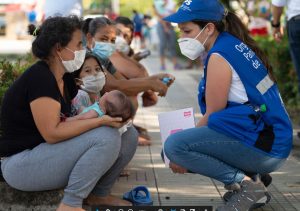WHO calls for action on refugee, migrant health
Millions of refugees and migrants across the world are experiencing poorer health outcomes than their host communities, according to the World Health Organisation’s (WHO) first ever report on the health of the world’s one billion expatriates.
The poorer health outcomes are due to the impact of various sub-optimal health determinants such as education, income, and housing, which are compounded by linguistic, cultural, legal and other barriers, the report says.
And the health status of refugees and migrants could jeopardize reaching the health-related Sustainable Development Goals (SDGs) for these populations.
Globally, the roughly one billion migrants represent about one in eight people on the planet.
Disease, famine, climate change and war have forced people to flee their homelands, and the conflict in Ukraine has helped push the number of displaced people worldwide to more than 100 million for the first time in history, the report notes.
 At the same time, the COVID-19 pandemic has disproportionately affected the health and livelihoods of migrants and refugees.
At the same time, the COVID-19 pandemic has disproportionately affected the health and livelihoods of migrants and refugees.
But the report, which is based on an extensive review of data from around the world, reveals that refugees and migrants are not inherently less healthy than host communities.
The report says that the experience of migration and displacement is a key factor in health and wellbeing, especially when combined with other factors.
And it highlights a recent analysis of more than 17 million participants from 16 countries across five WHO regions which found that migrant workers were less likely to use health services, and more likely to have an occupational injury, when compared with non-migrant counterparts.
Also, a significant number of the world’s 169 million migrant workers globally are employed in jobs that are dirty, dangerous and demanding.
They are at greater risk of occupational accidents, injuries, and work-related health problems than non-migrant workers. The situation is also exacerbated by their often limited or restricted access to, and use of, health services.
The report calls for urgent action to ensure people on the move can access healthcare services that are sensitive to their needs.
WHO Director General Tedros Adhanom Ghebreyesus said health care was a universal human right.
“Whether by choice or by force, to be on the move is to be human and is part of human life. Whatever a person’s motivation, circumstance, origin or migratory status, we must unequivocally reiterate that health is a human right for all, and that universal health coverage must be inclusive of refugees and migrants,” Dr Ghebreyesus said in the forward to the report.
WHO Deputy Director General Zsuzsanna Jakab called for more data to be collected on migrant and refugee health.
“It is imperative that we do more on refugees and migrants’ health but if we want to change the status quo, we need urgent investments to improve the quality, relevance and completeness of health data on refugees and migrants,” Dr Jakab said.
“We need sound data collection and monitoring systems that truly represent the diversity of the world population and the experience that refugees and migrants face the world over and that can guide more effective policies and interventions,” she said.
“Implementing inclusive health systems that conform to the principle of right to health for all and universal health coverage would permit individuals in need of health services to be identified and supported early, before many problems become acute,” the report says.
“Health systems are only as strong as their weakest link. The inclusion of refugees and migrants is a worthwhile investment for the development and wellbeing of societies around the world,” it says.
In Australia, Australian and New Zealand citizens, permanent residents, those applying for permanent residency and temporary residents covered by a ministerial order qualify for Medicare benefits.
But according to migrant and refugee advocates say migrants and refugees can face issues accessing health care.
They say financial issues are one problem, with GP visits potentially costing hundreds of dollars for people without Medicare.
But language and the complicated nature of the health system can also be barriers.
See the full report here: World report on the health of refugees and migrants (who.int)












